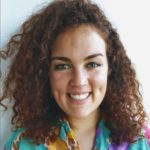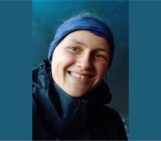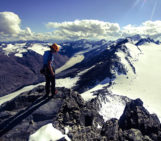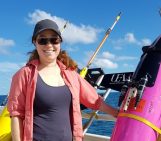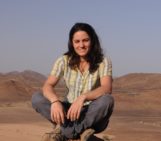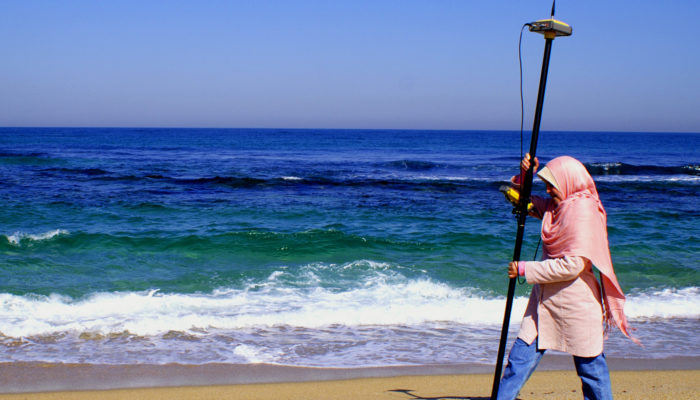
Happy International Women in Science Day 2021! We at EGU are very lucky to have many outstanding women who participate in the running of the European Geosciences Union. We are delighted to introduce you to just a few of our hard working, inspiring, creative and passionate women of EGU – especially as several of them will be stepping down at the General Assembly this year as their terms of service come to end, so we wanted to write this post to them with a huge THANK YOU!
 2021 Union President and current Vice-president Helen Glaves
2021 Union President and current Vice-president Helen Glaves
I am Senior Data Scientist at the British Geological Survey based in Nottingham in the UK with a background in both marine geoscience and geoinformatics. My work is currently focused on establishing and developing European environmental research infrastructures such as the European Plate Observing System. I am also actively involved in promoting open science through a number of initiatives including as a member of the Research Data Alliance Technical Advisory Board, and a supporter of groups such as the Coalition for Publishing Data in the Earth and Space Sciences. Previously I was the coordinator of two phases of the Ocean Data Interoperability Platform, and received the EGU Ian McHarg Medal 2016 in recognition of my contribution to ocean informatics as part of this international project.
My ongoing involvement with the international geoinformatics community also led to my election as the EGU Earth and Space Science Informatics (ESSI) Division President in 2017. I have also served as a member of the Outreach Committee and assumed responsibility for the EGU Mentoring Programme that aims to support those attending the General Assembly for the first time, especially Early Career Scientists. In 2019, I became the Union’s President-elect and will assume those responsibilities in April, once my term as Vice-President is complete.
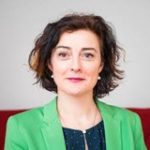 Union Secretary Prof Giuliana Panieri
Union Secretary Prof Giuliana Panieri
Giuliana Panieri is a professor in environment and climate at the Department of Geology at UiT. She was the leader of the PhD training school in arctic marine geology and geophysics AMGG that evolved in the Geoscience Research Academy of Tromsø GReAT in Tromsø and also member of the steering board for CHESS – Research school on Changing Climates in the Coupled Earth System. She was the President of the Biogeosciences Division at the European Geosciences Union and is currently the Union Secretary, as well as having an Adjunct scientist position at WHOI, Woods Hole Oceanographic Institution (USA).
She is mainly interested in using micropaleontology and geochemistry to study present and past methane emissions and methane hydrate dissociations. She seeks to answer questions regarding the timing, periodicity, and intensity of methane emissions with the final goal of assessing their evolution through time and understanding possible connections to climate change in the Arctic.
 Biogeosciences Division President Dr Lisa Wingate
Biogeosciences Division President Dr Lisa Wingate
With 59 publications, a small revolution in the field of ecosystem physiology and the geosciences, collaborating with experimentalists and modellers across international observatories, prestigious research fellowships, and promising insights on how soil microorganisms and plants control the chemistry of our atmosphere. Lisa Wingate brings insatiable curiosity and creativity to her research to understand how our ecosystems will respond to climate change in the future at scales spanning the enzyme to the globe.
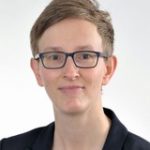 Earth Resources and the Environment Division President Dr Sonja Martens
Earth Resources and the Environment Division President Dr Sonja Martens
Sonja is a civil and environmental engineer by training with a background in both academia and industry. Her research focuses on hydrogeology, numerical flow and transport simulations and the sustainable use of georesources and the subsurface, for example investigating CO2 storage in geological media.
 Geosciences Instrumentation and Data Systems Division President Prof Lara Pajewski
Geosciences Instrumentation and Data Systems Division President Prof Lara Pajewski
I’m a Professor of Electromagnetic Fields in the Department of Information Engineering, Electronics and Telecommunications of Sapienza University of Rome, Italy. I have a PhD in Applied Electromagnetics and Electrophysics Sciences (Sapienza University of Rome) and a Laurea cum laude degree in Electronic Engineering (Roma Tre University). My research interests mostly are in GPR technology, methodology and applications, full-wave electromagnetic modelling of complex scenarios, geoscientific data processing and inversion methods, cultural heritage preservation, electromagnetic pollution, and science management.
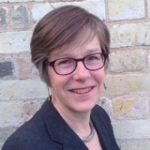 Geochemistry, Mineralogy, Petrology and Volcanology Division President Prof Marian Holness
Geochemistry, Mineralogy, Petrology and Volcanology Division President Prof Marian Holness
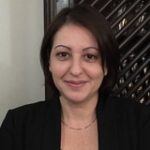 Hydrological Sciences Division President Dr Maria-Helena Ramos
Hydrological Sciences Division President Dr Maria-Helena Ramos
Maria-Helena Ramos is a research scientist in hydrology and hydrometeorology at the National Research Institute for Agriculture, Food and Environment (INRAE) in France. She is president of the EGU Division on Hydrological Sciences (HS) since April 2019.
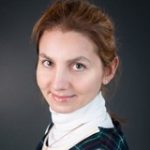 Natural Hazards Division President Dr Ira Didenkulova
Natural Hazards Division President Dr Ira Didenkulova
Ira works as Senior Research Scientist in the Department of Marine Systems at Tallinn University of Technology in Estonia and in Nizhny Novgorod State Technical University n.a. R.E. Alekseev in Russia. She has published more than 70 papers in reputed journals and was awarded the Plinius Medal by EGU (2010) and L’Oreal-UNESCO fellowship “For Women in Science” (2014). Her research interests lie in the field of extreme sea waves, such as tsunami and freak waves.
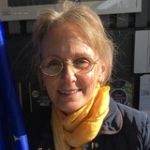 Ocean Sciences Division President Prof Karen Heywood
Ocean Sciences Division President Prof Karen Heywood
Karen Heywood is a British Antarctic oceanographer best known for her work developing autonomous measurements of the Southern Ocean. In 2020 the Heywood Glacier in Antarctica was named after her. It is located at 72°45’S, 61°45’W. The citation says “Glacier about 18 km long and 3 km wide flowing north from the Wegener Range, Palmer Land, to the west of Heezen Glacier, to join Maury Glacier. Named for Professor Karen Heywood (b. 1961), Professor of Physical Oceanography, University of East Anglia. Leader of six oceanographic research cruises to Antarctica since 1995, including Pine Island Bay, the Weddell Sea and the Scotia Sea and a pioneer of the use of autonomous ocean gliders”.
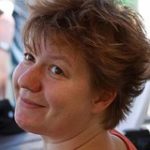 Planetary Sciences Division President Prof Stephanie C. Werner
Planetary Sciences Division President Prof Stephanie C. Werner
Stephanie C. Werner is a German geologist and planetologist, known for her work on Mars and the Arctic. She is a professor in the Centre for Earth Evolution and Dynamics of the University of Oslo in Norway. Her research has included the discovery that many meteorites of Martian origin come from the Mojave impact crater on Mars, and an estimate that an era of planetary migration in the solar system occurred earlier than previously thought.
 Solar-Terrestrial Sciences Division President Dr Olga Malandraki
Solar-Terrestrial Sciences Division President Dr Olga Malandraki
Olga Malandraki studied Physics in the University of Athens. She obtained a Ph.D. on Space Electrodynamics from the Department of Electrical Engineering and Telecommunications of the University of Thrace in Greece. She is now a Scientist of Space Physics in the Institute of Astronomy and Astrophysics of the National Observatory of Athens. She has expertise in the analysis and interpretation of data collected by spacecraft instrumentation by NASA and ESA (STEREO, Ulysses, ACE, Cluster, ΤHEMIS, CASSINI). She has investigated the magnetic topology of Interplanetary Coronal Mass Ejections (ICMEs), the particle propagation channels inside Corotating Interaction Regions (CIRs), the physical mechanisms of the establishment and maintenance of particle reservoirs in the Heliosphere, the solar origin of near-relativistic impulsive solar electron events and the comparison of solar particle events at high and low heliolatitudes.
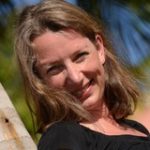 Publications Committee Chair Prof Katja Fennel
Publications Committee Chair Prof Katja Fennel
Katja Fennel is an oceanographer studying the effects of climate change on marine ecosystems. She is a full professor in the Department of Oceanography at Dalhousie University, a former Canada Research Chair in marine prediction, and co-editor-in-chief of the journal Biogeosciences. As head of the Marine Environmental Modeling Group she leads the development of marine ecosystem and biogeochemical models at Dalhousie. For the past two decades Katja has developed and applied numerical models of marine ecosystems and biogeochemistry and the assimilation of observations into these models in order to improve their predictive capabilities. She has authored and co-authored >60 publications in the peer-reviewed literature, and collaborated in several major national and international research projects including the NSF-funded North Atlantic Bloom experiment, the NSERC Ocean Tracking Network, the US IOOS-funded Coastal and Ocean Modeling Testbed (COMT), and the Marine Environmental Observation, Prediction and Response (MEOPAR) Network of Centers of Excellence.
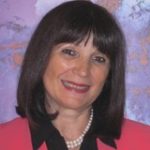 Outreach Committee Chair Dr Mioara Mandea
Outreach Committee Chair Dr Mioara Mandea
Mioara Mandea is currently Programme Manager for the Solid Earth Observation / Directorate for Strategy and Programmes of Centre National d’Etudes Spatiales (French Space Agency), Paris. She has a broad international education and has worked in Romania, France, and Germany. She graduated in Engineering in Geology and Geophysics from the University of Bucharest before obtaining doctorates from the University of Bucharest in geophysics and geophysical prospecting in 1993 and from the Institut de Physique du Globe de Paris in internal geophysics in 1996. Mioara’s research interests mainly concern measuring, mapping, and understanding the multitude of magnetic fields encountered in near Earth and near Earth-like planets. She has concentrated her work in some major directions, participating in the general effort of measuring Earth’s magnetic field from ground to space, developing new tools to model the geomagnetic field and its secular variations (with a special emphasis on geomagnetic jerks), or using the geomagnetic information to determine physical properties in the deep Earth’s interior (with special studies on the lower mantle conductivity or motions at the core-mantle boundary).
Equality, Diversity and Inclusion Working Group Chair, Dr Claudia Alves de Jesus-Rydin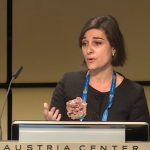
Claudia Alves de Jesus-Rydin is currently a Research Programme Officer with the European Research Council. Having originally trained as a Geotechnical Engineer, she graduated from the New University of Lisbon and moved to Denmark in 1999 as a Marie Curie grant holder, carrying research on soil and groundwater pollution. She lived for serveral years in Lund where she worked as an environmental consultant. For the last few years she has been the coordinator of the Earth System Science scientific area at the European Research Council (ERC). Furthermore, Claudia is an active member of the Gender Balance Working Group at the ERC.
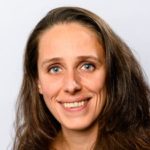 Early Career Scientist Union Representative Dr Anouk Beniest
Early Career Scientist Union Representative Dr Anouk Beniest
As the Union-level Early Career Scientists representative, I am here to voice the needs and ideas of Early Career Scientists to Council. In addition, I will contribute to the development and implementation of a more inclusive and sustainable General Assembly. My background is in tectonics and structural geology, using numerical and analogue modelling methods, structural geological data and (in the near future) geophysical data to solve geological problems at the scale of the lithosphere. This multi-disciplinary skill-set allows me to communicate with scientists with many different background, which hopefully proves to be a very useful skill next year, when I represent the Early Career Scientists at Union-level.
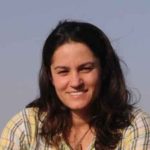 Deputy Union-level ECS Representative Dr Anita Di Chiara
Deputy Union-level ECS Representative Dr Anita Di Chiara
My background is in geology and paleomagnetism, the study of the Earth’s Magnetic Field variations recorded on rocks to understand its origin and evolution, to reconstruct tectonic rotations and paleoclimatic variations and as dating and correlating tool for volcanics, sediments and archeological sites. The multidisciplinary of my studies allows me to connect with ECS and Senior scientists from different Divisions and the skills acquired while EMRP Division representative, together with my enthusiasm for ECS and EDI topics, will facilitate my dialogue with ECS and my role as future ECS Union representative.
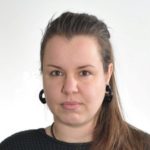 Biogeosciences Division ECS Rep, Dr Hana Jurikova
Biogeosciences Division ECS Rep, Dr Hana Jurikova
Hana is a postdoctoral researcher at the GFZ German Research Centre for Geosciences – Helmholtz Centre Potsdam. Her research primarily involves the application and development of novel isotopic techniques to gain insights into past climatic and environmental changes, Earth’s biogeochemical cycles and their feedbacks, with focus on carbon cycle dynamics. She is also interested in biomineralisation processes of brachiopods and corals and what geochemistry can tell us about calcification and the state of the oceanic carbonate system.
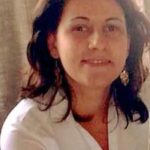 Climate: Past, Present and Future Division ECS Rep Dr Carole Nehme
Climate: Past, Present and Future Division ECS Rep Dr Carole Nehme
Carole is lecturer in physical geography at the University of Rouen (France) since September 2016 with expertise in limestone geomorphology, cave monitoring and palaeoclimate reconstruction from geochemical proxys. A former postdoc fellow at the AMGC research group, Vrije Universiteit Brussels and the Royal Belgian Institute of Natural Sciences, she worked on the reconstruction of past climate in the Levant from geochemical proxys in speleothems.
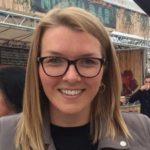 Cryospheric Sciences Division ECS Rep Dr Jenny Turton
Cryospheric Sciences Division ECS Rep Dr Jenny Turton
Jenny is a postdoc scientist at Friedrich-Alexander University (FAU) in Erlangen-Nürnberg, Germany. Her main research topics include polar meteorology and climatology, and atmosphere-cryosphere interactions. Currently, her focus is in North East Greenland, to investigate the impacts of the atmosphere on the mass balance of marine-terminating glaciers. Jenny has previously convened short-courses and been a social media rep for the EGU Cryospheric Sciences division (CR).
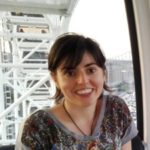 Earth Magnetism and Rock Physics Division ECS Rep Dr Saioa A Campuzano
Earth Magnetism and Rock Physics Division ECS Rep Dr Saioa A Campuzano
Some information about me: I am a postdoctoral researcher at Spanish National Research Council (CSIC) in Madrid, Spain. My main research interests are the study of the Earth’s magnetic field variations in different space and time scales using from paleo- to satellite magnetic data, and the study of possible links between different geophysical and climate variables using information-theoretic tools and another sophisticated techniques.
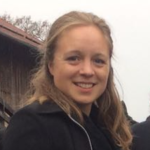 Geodesy Division ECS Rep Dr Katrin Bentel
Geodesy Division ECS Rep Dr Katrin Bentel
Katrin is a postdoc at the Astronomical Institute at the University of Bern in Switzerland. Her research interest are in satellite geodesy, gravity field modeling and the GRACE gravity mission.
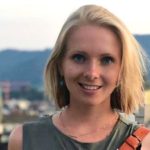 Geodynamics Division ECS Rep Anna Gülcher
Geodynamics Division ECS Rep Anna Gülcher
Anna Gülcher is a PhD student in the Geophysical Fluid Dynamics group at ETH Zürich and works on compositional heterogeneity in the Earth and its effect on mantle dynamics. For this, she aims at putting geophysical, geological and geochemical observations in a geodynamically coherent framework. Anna has been involved as a co-editor for the GD blog and as the GD ECS Rep, aims at even more connecting the GD community through various ECS events, the GD blog and through social media.
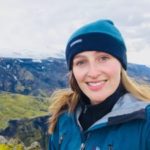 Geochemistry, Mineralogy, Petrology and Volcanology Division ECS Rep Emily Mason
Geochemistry, Mineralogy, Petrology and Volcanology Division ECS Rep Emily Mason
Emily is a PhD student in the Department of Earth Sciences at the University of Cambridge. She studies gas and aerosol emissions from volcanoes, with a particular emphasis on emissions of trace metals. Her research involves tracing the pathways of metals and metalloids from the shallow magmatic system to the atmosphere and the processes that take toxic elements downwind.
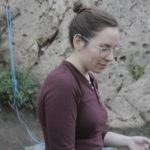 Hydrological Sciences Division ECS Rep Caitlyn Hall
Hydrological Sciences Division ECS Rep Caitlyn Hall
Caitlyn is a PhD candidate at Arizona State University. She focuses on using in situ microbial methods to reduce the potential of earthquake-induced liquefaction in vulnerable locations. She is performing research on biochemical techniques to reduce crude oil contamination in soils. Caitlyn is passionate about growing collaboration in the geoscience community and interaction between scientists and policy-makers and is working to synthesize best practices. Caitlyn is an active rock climber and backpacker and still relies on geology friends to identify rocks.
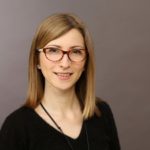 Natural Hazards Division ECS Rep Dr Valeria Cigala
Natural Hazards Division ECS Rep Dr Valeria Cigala
I’m currently a postdoc fellow at LMU in Munich, Germany. I’m a volcanologist and I’m working on developing a novel technique to detect and monitor volcanic ash in the atmosphere after an explosive eruption occurred. More in general, I’m interested in volcanic explosive dynamics, techniques to better understand and monitor them and their related hazards. I’m also involved in NH division blog as author and editor.
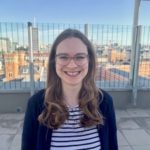 Ocean Sciences Division ECS Rep Meriel Bittner
Ocean Sciences Division ECS Rep Meriel Bittner
Meriel is a PhD student at the Marine Biological Section of the University of Copenhagen. She is passionate about marine biogeochemical cycles and biological oceanography. Although, originally from Germany she studied in Austria and holds a degree in Ecology and Ecosystems from the University of Vienna, where she worked on the deep sea and marine carbon cycling mediated by microbes. Meriel’s current research focus is on vitamins in the coastal ocean.
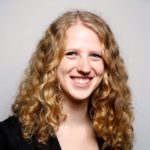 Seismology Division ECS Rep Janneke de Laat
Seismology Division ECS Rep Janneke de Laat
Janneke is a PhD student in seismology at the Dublin Institute for Advanced studies in Ireland. She works on global surface-wave tomography, i.e. visualising the Earth’s lithosphere using seismic surface waves. She is mainly focussed on the Australian plate and the North Atlantic region, hoping to better understand the structure and evolution of these tectonically fascinating areas.
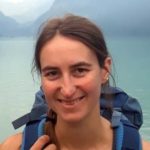 Sedimentology, Stratigraphy and Palaentology Division ECS Rep Dr Madeleine Vickers
Sedimentology, Stratigraphy and Palaentology Division ECS Rep Dr Madeleine Vickers
Madeleine is a post-doctoral researcher at the University of Copenhagen. Her research interests lie in understanding the complex interactions between the various and numerous drivers of Mesozoic climate change both on a global and regional scale.
Layla is a PhD student in Soil Biogeochemistry at Institute for Natural Resources and Agrobiology of Seville, Spain (IRNAS–CSIC). Her research focuses on soil organic matter (SOM) and carbon turnover rates in representative Mediterranean soils from southern Spain. She is developing analytical approaches that comprises structural and chemical aspects related to SOM, such as microbial biomarkers and isotopes, to elucidate SOM transformation.
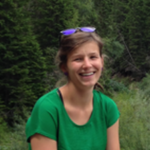 Solar-Terrestrial Sciences Division ECS Rep Theresa Rexer
Solar-Terrestrial Sciences Division ECS Rep Theresa Rexer
Theresa is in her third year of her PhD at the Arctic University of Norway in Tromsø. She is working with active experiments and Incoherent scatter radars studying the electromagnetic wave and plasma interactions in the ionosphere and space.

